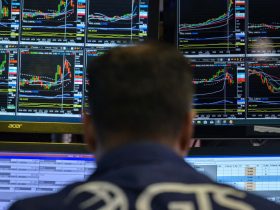Note: Costco FY’23 ended on August 27, 2023. Q4 results are scheduled to be announced on Sept 26.
After a 23% increase year-to-date, at the current price of around $563 per share, we believe Costco (NASDAQ: COST), a warehouse club operator – is fairly priced. COST stock has increased from around $457 to $563 YTD, outperforming the broader indices, with the S&P growing about 16% over the same period. The retailer’s consistent performance at driving revenue coupled with its dedication to enhancing customer experience, reflects its ability to thrive in the ever-changing retail landscape.
Notably, COST stock had a Sharpe Ratio of 0.9 since early 2017, which is higher than the figure of 0.6 for the S&P 500 Index over the same period. Compare this with the Sharpe of 1.2 for the Trefis Reinforced Value portfolio. Sharpe is a measure of return per unit of risk, and high-performance portfolios can provide the best of both worlds.
It is worth pointing out that despite the pandemic and inflation, the business has managed to grow strongly. Consumers loaded up on essentials in high quantities to keep costs low. However, Costco showed weaker than usual year-over-year comp store sales growth in Q3 at just 0.3%. This was driven by weakening demand for high-ticket discretionary items, thus lowering the average ticket, which dropped 4.3% y-o-y. The lower average ticket was offset by higher traffic volumes which grew 4.8% y-o-y. The recent decline might be alarming but Costco makes a majority of its profits from its membership income, so comparable sales growth isn’t as important for it as it is for other retailers. In the latest Q3, membership fee income was 6% higher than the prior-year period. Card members increased by 7% over last year in the third quarter and the renewal rate remained strong, at 92.6% in the U.S. and Canada. This high renewal rate not only ensures a steady stream of revenue from membership fees but also increases the lifetime value of each customer, thereby boosting overall profitability. We need to keep an eye on this metric when calculating Costco’s long-term growth potential. Also, Costco currently boasts nearly $14 billion in cash, cash equivalents, and short-term investments. Its long-term debt is only $6.5 billion, so Costco has a net cash position on its balance sheet.
We have revised COST’s valuation to $564 per share, based on a $14.08 expected EPS and a 40.0x P/E multiple for the fiscal year 2023 – in line with the current market price. We forecast COST’s Revenues to be around $242 billion for the fiscal year 2023, up 7% y-o-y. The stock’s current valuation at 42 times earnings is much higher than the 25 to 30 P/E range before the pandemic, which means investors could see a couple of scenarios play out. There is the possibility that the shares could decline until the valuation falls in line, especially if a recession sinks the broader stock market. Alternatively, the stock may oscillate as earnings grow and valuations catch up.
It is also helpful to see how its peers stack up. Check out how COST’s Peers fare on metrics that matter. You will find other valuable comparisons for companies across industries at Peer Comparisons.
Invest with Trefis Market Beating Portfolios
See all Trefis Price Estimates
Read the full article here













Leave a Reply